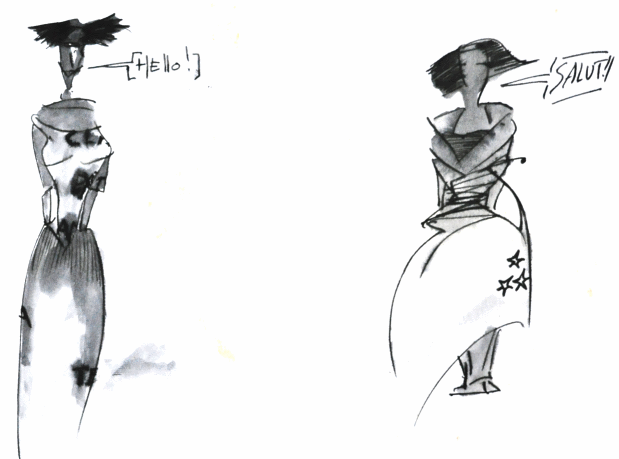Continuing with metrics…
Everybody can easily recognize a tune, a famous painting or the face of a friend. Not so for a computer, who must first digitize the information, and operate on this dataset to find similarities. Back in the beginning of computer era, people though that it would be easy to recognize characters or voice, but technology had hard time with these issues. OCR is still perfectible, while voice recognition is still not common (things are getting better, but Siri is still fallible) Continue readingSubluminal
Slower than the speed of light, but not by much
Category Archives: epistemology
Welcome to the metrics
Everything that can be measured can be managed – Peter Drucker

Because measuring allows to make decision, by empowering evaluation and the comparison between elements, and thus to make optimal choices and perform improvements. But measuring something is not always easy. Continue reading
Toi et tes recherches
English readers : this post is about a French translation of R. Hamming’s talk
‘You and your research’ I’ve made.
You can already enjoy the text in your own language!
Lorsque l’on est célèbre, il est difficile de travailler sur de petits problèmes. C’est ce que pourtant fit Shannon. Après avoir fondé théorie de l’information, comment réitérer un tel succès? Les grands scientifiques font souvent cette erreur. Ils n’arrivent pas à se contenter de planter les petits glands qui ensuite font de beaux et grands chênes. Ils s’attaquent tout de suite aux gros morceaux. Et ce n’est pas la façon dont les choses se font. C’est donc une autre raison pour laquelle une reconnaissance précoce finit par vous stériliser. Je vais même vous donner ma citation préférée.
L’Institute for Advanced Study à Princeton, a, à mon avis, ruiné plus de bons scientifiques que n’importe quelle autre institution, à en juger par la différence entre ce que ces scientifiques ont fait avant leur arrivée et ce qu’ils ont fait ensuite. Non pas qu’ils ne sont pas qu’ils s’en sortaient mal, mais s’ils étaient géniaux avant d’arriver, ils n’étaient que simplement bons après.
Bonne lecture !
Faster than light !
No shame !
That’s what Nature said to those Prometheuses who wanted to steal the neutrinos from the realm of light (via).
No shame, because they put themselves at risk, claiming that the centenary rule that nothing can go faster than light might not be so unbreakable, while keeping their calm at all time.
- “point 5 past light !”
The best is their allegations re-opened the debate on what the speed of light really is the limit of.
Even though I’m not a specialist in special relativity, I was pleased to hear the crazy theories like this one :The speed of light is like a barrier. You cannot cross it, but you can be already on the other side, where the neutrinos might be.
Photons are exactly on the wall : they cannot go any slower or faster.(as heard on the radio).
I liked this picture because it relates to two (mis?)conception that I have.
Bombykol
I recently read the book “Bad Science” by Ben Goldacre (it’s worth buying, but if you are remote, you can still visit the Pirate Bay… There is also some very nice material on this website).
It’s an excellent book, about great scientific scams, such as homeopathy, memory of water, alledged extra-benefits of highly expensive cosmetics and nutrition), and gives a good discussion about Placebo effect. Continue reading
The two cultures
I OCRed the manuscript of the famous “The Two Cultures” lecture by R.C. Snow.
You can find an html version, or read the original version in a poorly-scanned pdf.
I don’t want to choose. I guess I’m a bit oldschool.
I think that one possible definition of our modern culture is that it is one in which nine-tenths of our intellectuals can’t read any poetry. – Randall Jarrell
Here’s an extract of “The two cultures” :
The non-scientists have a rooted impression that the scientists are shallowly optimistic, unaware of man’s condition. On the other hand, the scientists believe that the literary intellectuals are totally lacking in foresight, peculiarly unconcerned with their brother men, in a deep sense anti-intellectual, anxious to restrict both art and thought to the existential moment. And so on.
Anyone with a mild talent for invective could produce plenty of this kind of subterranean back-chat. On each side there is some of it which is not entirely baseless. It is all destructive. Much of it rests on misinterpretations which are dangerous. I should like to deal with two of the most profound of these now, one on each side.
Une parabole
English readers : this post is about a French translation of E.W. Dijkstra’s ‘Parable’ (archive EWD594) I’ve made.
You can already enjoy the text in your own language!
Le plaisir de l’imagination
English readers : I’ve made the transcript of the wonderful “Fun to Imagine” interviews of Feyman.
You should definitely watch it or read it!
version française (html)
version française (pdf)
version originaleVoici un extrait du transcript traduit: Continue reading
